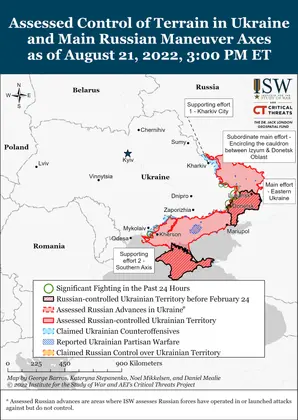Key Takeaways
- Russian offensive operations in eastern Ukraine have likely exhausted the limited momentum they gained at the end of July and are likely culminating. The Russian military has shown a continual inability to translate small tactical gains into operational successes, a failing that will likely prevent Russia from making significant territorial advances in the coming months barring major changes on the battlefield.
- Ukrainian military intelligence reports that Russia and Belarus have reached an “urgent” agreement for Belarus to repair damaged Russian aviation equipment for re-use in Ukraine. This agreement could be part of a Russian effort to use the looser sanctions regime on Belarus to circumvent sectoral sanctions on Russia.
- Russian forces attempted several unsuccessful ground assaults southwest and southeast of Izyum.
- Russian forces launched a ground attack southeast of Siversk and northeast and south of Bakhmut.
- Russian forces made limited gains west of Donetsk City but did not conduct any ground assaults on the Donetsk-Zaporizhia Oblast administrative border.
- Russian forces attempted unsuccessful ground assaults southwest of Donetsk City and continued attacking settlements northwest and southwest of Avdiivka.
- Russian forces conducted several assaults on the Kherson-Mykolaiv frontline and made partial advances east of Mykolaiv City.
- Russian forces are likely not training new recruits in discipline, creating an entitled force engaging in disorderly conduct in Russia and illegal conduct in Ukraine.
- Russian occupation authorities intensified filtration measures and abductions in occupied territories ahead of Ukraine’s Independence Day on August 24.
Russian forces’ momentum from territorial gains around Bakhmut and Avdiivka in late July is likely exhausted, and Russian attacks in eastern Ukraine are likely culminating although very small Russian advances will likely continue.
JOIN US ON TELEGRAM
Follow our coverage of the war on the @Kyivpost_official.
Russian forces seized Novoluhanske and the Vuhlehirska Thermal Power Plant (TPP) southeast of Bakhmut on July 25 and 26, respectively, consolidating Russian control around difficult water features after many weeks of fighting. Russian sources celebrated these gains as a significant military victory without noting that Ukrainian military Ukrainian forces successfully broke contact and withdrew from the area. Russian forces also celebrated the capture of Ukrainian fortifications around the Butivka Coal Mine ventilation shaft southwest of Avdiivka, after Ukrainian forces withdrew from the area on July 30. Russian forces capitalized on these gains to a limited extent and have been attacking toward Bakhmut from the northeast and southeast, and around Avdiivka, but these attacks are now stalling. Russian forces have not made significant territorial gains around Bakhmut or Avdiivka since their advances through Novoluhanske, the power plant, the Butivka Coal Mine, and a few small settlements near those areas.
Russian forces’ failure to capitalize on prior gains around Bakhmut and Avdiivka is an example of a more fundamental Russian military problem—the demonstrated inability to translate tactical gains into operational successes.

ISW Russian Offensive Campaign Assessment, January 25, 2025
Russian forces have consistently failed to take advantage of tactical breakthroughs to maneuver into Ukrainian rear areas or unhinge significant parts of the Ukrainian defensive lines. They therefore continually give the Ukrainians time to disengage tactically and re-establish defensible positions against which the Russians must then launch new deliberate attacks. This phenomenon helps explain the extremely slow rate of Russian advances in the east and strongly suggests that the Russians will be unable to take much more ground in the coming months unless the situation develops in unforeseen ways. Russian forces will likely remain unable to commit enough resources to any one offensive operation to regain the momentum necessary for significant territorial advances that translate to operational successes. Russian forces will also need to generate and commit additional assault groups, equipment, and morale to resume even these limited territorial advances yielding small tactical gains.
Russian forces likely face issues repairing combat aircraft due to Western sanctions and may be attempting to bypass these sanctions by leveraging Belarusian connections with less severe sanctions. ISW
The Ukrainian Military Intelligence Directorate (GUR) stated that the Russian and Belarusian Defense Ministries signed “urgent” contracts on August 20 to repair and restore Russian military aviation equipment on Belarusian territory reportedly for further use in Ukraine. Western sanctions against Russia have largely banned the transfer of equipment to the state of Russia as a whole, while sanctions against Belarus largely target individual Belarusian entities. Western countries have previously sanctioned Belarusian industrial-military complex entities producing radar systems, automobiles, and repairing tracked vehicles, but it is unclear to what extent the sanctions impacted Belarusian import of aviation repair parts. The Ukrainian General Staff reported that Russian forces transferred some unspecified air defense equipment to Belarus from Russia on August 21. The Ukrainian General Staff also reported that Russian forces will close certain sections of Russian airspace in the Lipetsk, Voronezh, and Belgorod Oblasts from August 22-25. The Russian-Belarusian agreement may suggest that Russian officials are attempting to circumvent sanctions on Russia, as it may be easier to import repair parts to Belarus than to Russia.
You can also highlight the text and press Ctrl + Enter










